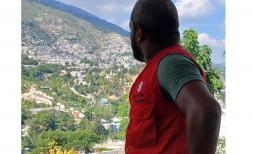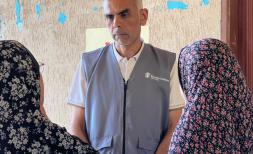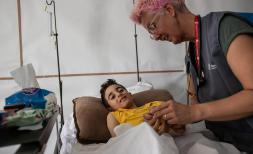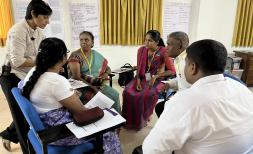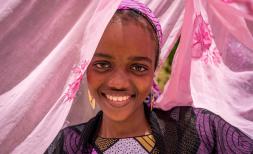Keeping literacy alive during COVID-19

Wilson, 10, reading a book outside his reading club, Rwanda.
Every child has a right to learn to read – and every child requires literacy skills to open up life choices and opportunities. Research has shown that children have a greater chance of success in school and later life if they develop foundational skills such as literacy and numeracy. A lack of these skills is strongly linked to social exclusion and reinforcement of inequalities and disadvantage.
The global COVID-19 pandemic and the consequences of lockdowns are magnifying the existing literacy challenges and exponentially increasing the inequity between children who are supported to read and those who aren’t.
Literacy under threat
The COVID-19 pandemic has led to unprecedented levels of disruption to education, impacting over 90% of the world’s student population: 1.54 billion children, including 743 million girls. Our Save Our Education report revealed that once the crisis is over, nearly 10 million children may never return to school.
Despite the efforts of governments and organisations to address the ongoing crisis, some 500 million children – often the poorest and most marginalised – have no access to distance learning. Even if children can access distance learning materials, many do not have literate parents who can help them.
Giving literacy a boost
For over 10 years, our Literacy Boost approach has helped teachers, students, parents and community members to develop the literacy skills of children in the primary grades, both inside and outside of the classroom. The programme works with the existing national curriculum and focuses on developing skills that children need for independent reading with the core components of teacher training, community action, enhancing the literacy environment and student assessments.
Since the approach first started in 2009 in Malawi, we have collected a large body of evidence about efficacy of the approach. Importantly, components of the approach can still be applied in times of coronavirus, with a little adaptation.
A young girl learns at home with a memory card game, Guatemala
Adapting our work to keep literacy alive
In Indonesia, where most of the country’s 500,000 schools are still closed, we have introduced a ‘Visiting Teachers’programme which involves school teachers visiting small groups of children at their homes in Central Sulawesi and West Java provinces. This allows children with limited or no internet access to continue studying during the pandemic.
We have also broadcast YouTube and community radio talk shows to encourage positive parenting and home learning – and in the East Nusa Tenggara province, school librarians and literacy community volunteers are distributing and swapping books from home to home to keep children reading. Parents and children are taking part in competitions to strengthen their literacy levels.
In Guatemala, we are distributing alphabet and nutrition memory games which have been adapted to local languages. We’ve adapted our traditional reading camps to be transmitted weekly via local radio stations with sessions including singing time, story time and letter knowledge. The sessions also encourage parents to be involved in their children’s education and to stay involved as schools start to reopen.
In Rwanda, we are broadcasting children’s stories every week so children can continue to hear stories read aloud no matter their parents’ literacy levels. Through partnership with a local organisation, Youth Volunteers with Disabilities, who are running workshops in several villages, we are empowering children with disabilities to practice reading and do other activities together with their parents.
In collaboration with the Rwanda Education Board, we will soon be broadcasting a radio drama series with messages for parents on how to support their children’s learning and reading at home.
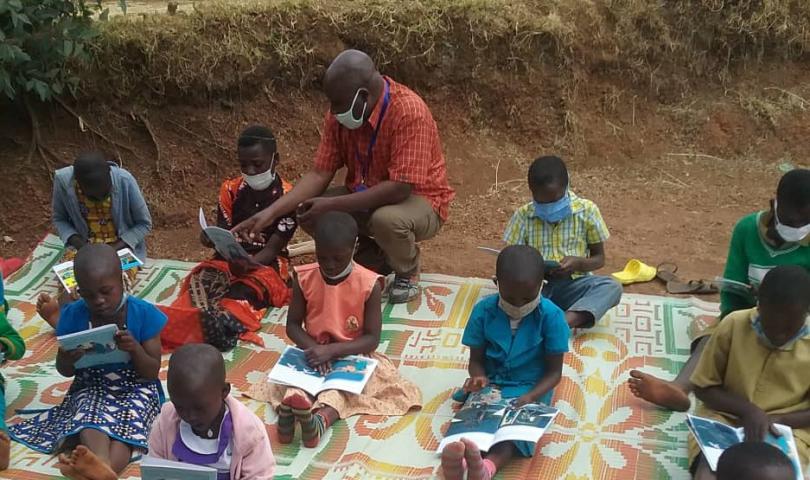
A community education worker supervising children during a free outdoor reading session, Rwanda
In Malawi, we are ensuring that children aged five are still given the chance to start their education early through home-directed interactive radio instruction which goes out to the whole country, reaching more than 2 million children with early literacy and maths concepts. We have also developed paper-based home learning cards and storybooks and we will support parents to use the paper-based tools in four districts.
In Bangladesh, we are supporting children’s learning in refugee camps through peer education sessions whereby children with good cognitive and leadership skills facilitate learning sessions with two or three peers who have had no or little previous education. Teachers are able to deliver activities to very small groups of children in camps to maintain safety measures.
In the Solomon Islands, we have adapted our ‘Emergent Literacy and Maths at Home’ package for delivery over the radio to support the development of early literacy skills for children in rural areas. The package is specifically designed to support the children of parents who are engaged in daily subsistence agriculture and fishing and often have low adult literacy rates.
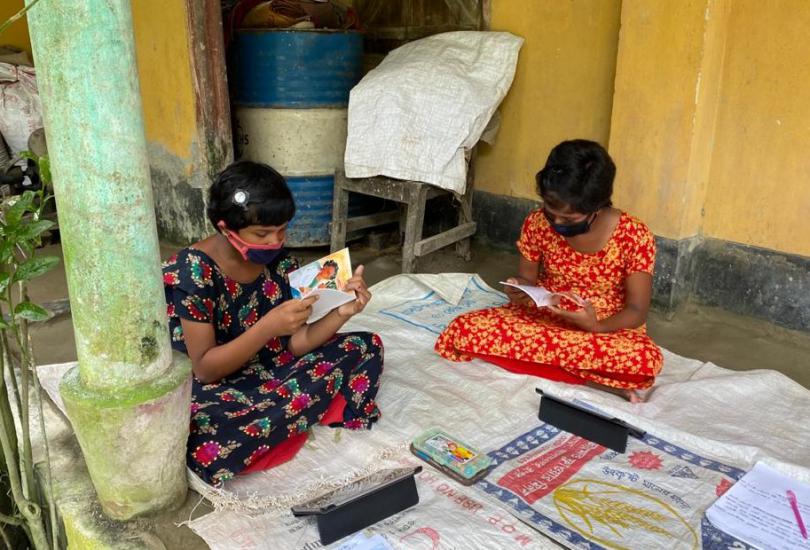
Students learning with tablets at Rajarhat upazila, Bangladesh
All over the world, we have been rapidly adapting our existing work to ensure that children can continue their literacy journeys of discovery. A child’s right to a good quality, safe and inclusive education does not end if schools are closed. We must ensure that all children continue to learn while schools are closed, through inclusive distance learning.
And as we start to see some schools reopening in some places around the world, we must make sure that every child is supported to return to school when it’s safe to do so – and that education systems are stronger, so that every child gets a good education and the chance to build a better future.
Read more in this blog on celebrating literacy in the Solomon Islands and Papua New Guinea
Find out more about the full scale of the global education emergency facing a generation of children – and our #SaveOurEducation campaign to tackle this.
